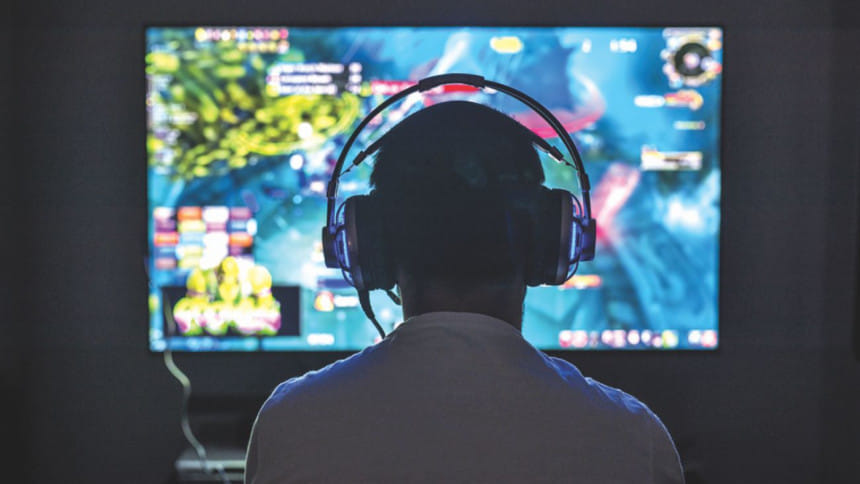Virtual play to combat mental illness

Out of the 161 million people of Bangladesh (as of 2015), 16.1 percent of adults and 15.2 percent of five- to 10-year-olds live with mental health issues. Only 0.44 percent of our national budget was allocated for mental health in the same year. Provided in the report "Pathways to care of patients with mental health problems in Bangladesh" published in the International Journal of Mental Health Systems in 2018, the statistics may be fresh, but the information is age-old. Mental health issues plague the young and the old in this country, but far too many fail to understand and acknowledge them, while physicians fail to refer patients to mental health experts, who are in turn scarce.
WHO's theme for this year's World Mental Health Day is "Young people and mental health in a changing world." The post on their website addresses how "the expanding use of online technologies, while undoubtedly bringing many benefits, can also bring additional pressures [for young people], as connectivity to virtual networks at any time of the day and night grows." With my memories of high school and college still relatively fresh, I understand what such pressures entail. I remember, all too clearly, how family problems, break-ups, bad grades, the fear of being bullied, and even the pressure of maintaining social cache can feel like the end of the world for youngsters. I remember the red gashes on classmates' wrists, the stories of medicine overdose, and the gradual disappearance of common faces as they descended into drug abuse. When I hear stories and confessions from younger cousins and their friends, I realise that these issues have only multiplied with the use of online platforms, manifest in cyberbullying and the threat to privacy.
This is one set of realities of the youth today. The other is that video gaming is a huge part of their lives, regardless of whether they're teenagers, college students, or recent graduates trying to jumpstart a career. According to a Daily Star report from last year, Bangladesh makes up the third-largest video gaming market in South Asia, and video games account for 10 percent of the Tk 8,000 crore ICT market of the country. They may seem to belong to two entirely separate worlds—mental health and video gaming—but with so many young Bangladeshis taking refuge in virtual realms, it's only natural that the two should correlate.
My 13-year-old cousin tells me playing video games gives him something to look forward to. Winning a game makes him feel empowered, and having gaming knowledge helps him make friends and communicate better with those around him. Wasiur Rahman (19), a family friend transitioning from high school to college, explains that violent video games help him channel his emotions on a bad day and recover from stress immediately. "FPS (First Person Shooter) games like COD or Battlefield have also showed me the brutal sides of war and how much suffering it causes. It made me realise how strongly I feel against war; and that you may be able to 'respawn' in a game, but you only live once in real life," he shares. For my friend Shahrukh Ikhtear (22), a management trainee at Grameenphone, it offers a necessary respite from work stress. "The deep narratives of some single-player games help me feel empowered as I am in charge of my actions in those virtual spaces. Multiplayer games satiate my competitive nature while doing something fun," he tells me.
Some studies support this testimony. Research carried out jointly by Johns Hopkins University, Queensland University of Technology, and University of the Sunshine Coast has found that moderate amounts of video gaming can "contribute to emotional stability and reduce emotional disturbances in children." Feelings of anger, guilt, or frustration seem to dissipate fast after children spend some time inside video games. Contributing to a narrative larger than oneself helps battle depression, and interaction with online communities allows kids to share sensitive emotions that they're struggling with. This doesn't just mean an absence of mental health issues, but an actual positive impact on their wellbeing. Children experience greater self-esteem in terms of their intelligence, computer skills, and mechanical ability. WHO tagged gaming addiction as a mental disorder earlier this year, but they stressed that it refers strictly to very extreme cases. The keyword is moderation.
This is good news for us in a country where playgrounds and open spaces seem like a fantasy in urban areas. The threat of abduction, harassment, and road accidents makes it too unsafe for kids even to walk around the city, let alone play outdoors. Coupled with the scarcity of mental health experts and the outright refusal of many families to address mental health issues, this leaves little to no avenues through which the youth can deal with stress, depression, and more extreme mental illnesses. Fortunately, they seem to have found channels of mental release and positivity for themselves on their own. Perhaps we can put this to some use?
Sarah Anjum Bari studied History and Literature at the Columbia University campus in France.










Comments